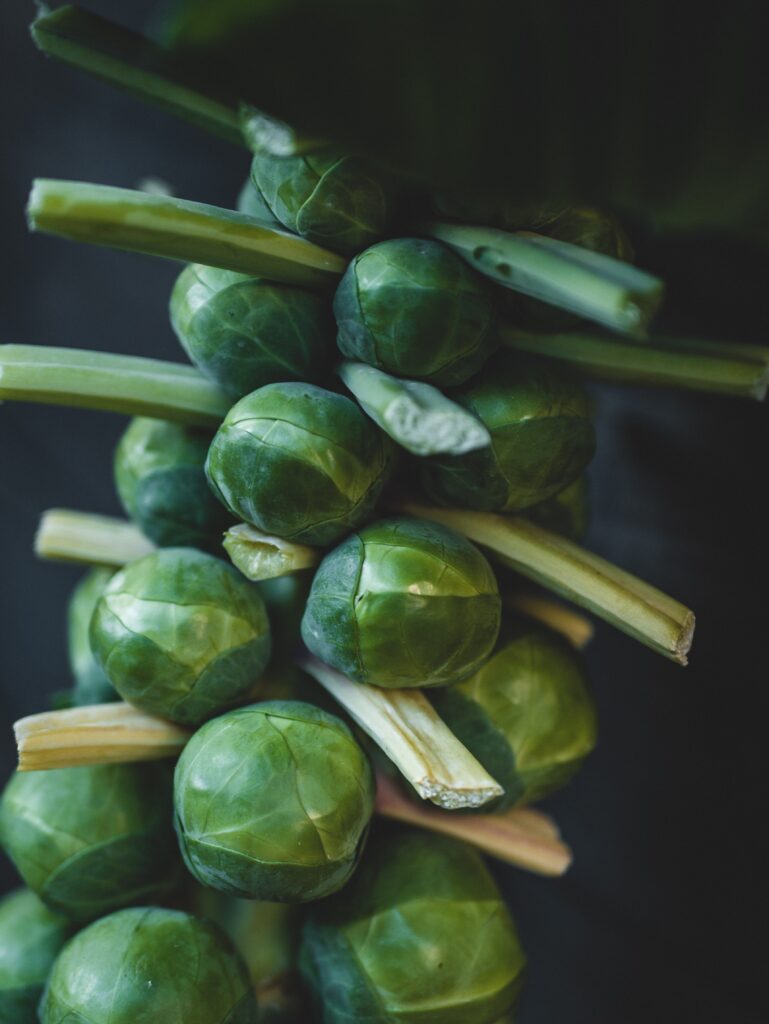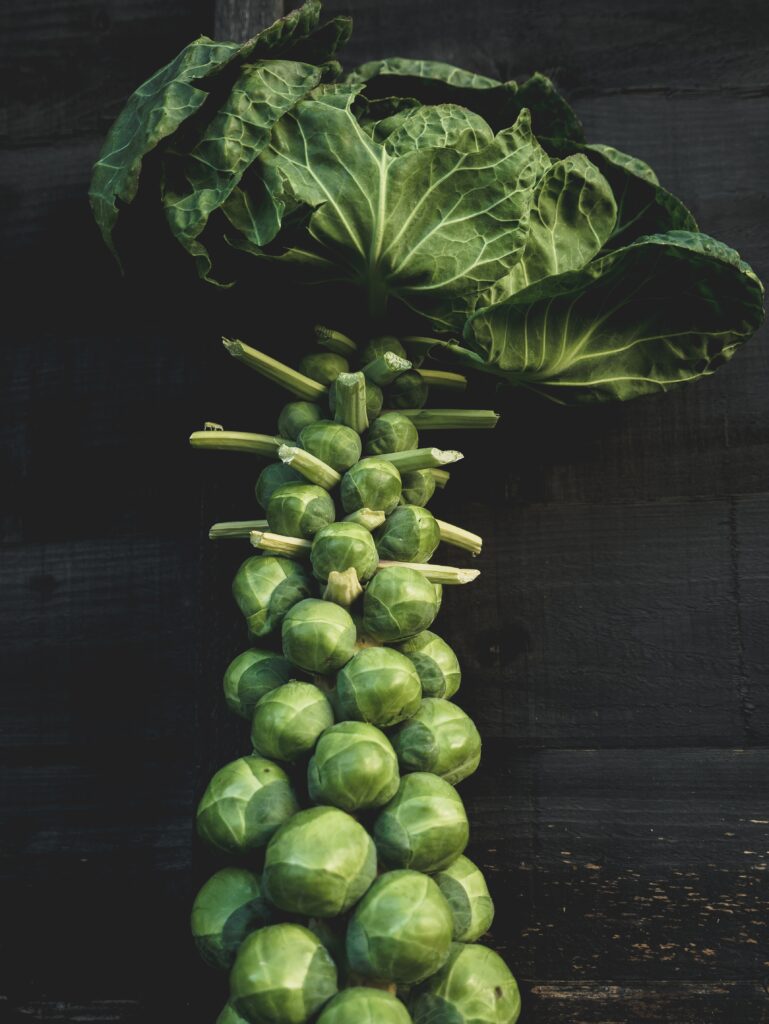Brussels sprouts may not be everyone’s favorite vegetable, but they certainly pack a punch when it comes to health benefits. These cruciferous veggies are rich in antioxidants, such as vitamin C, which help to protect cells from damage that could lead to heart disease and cancer. Additionally, the anti-inflammatory compounds found in Brussels sprouts can reduce inflammation and lower the risk of chronic diseases. With high fiber content, these veggies can regulate blood sugar levels and support digestive health. Lastly, Brussels sprouts are loaded with vitamin K, which plays a role in bone health. Incorporating Brussels sprouts into your regular diet can provide you with an array of health benefits that promote overall wellness.

Rich in Antioxidants
Brussels sprouts are a rich source of antioxidants, making them a valuable addition to a healthy diet. Antioxidants are compounds that help protect cells from damage caused by harmful molecules called free radicals. Free radicals are highly reactive and can cause oxidative stress, which has been linked to various chronic diseases, including cancer and heart disease.
Antioxidants work by neutralizing free radicals, preventing them from causing damage to cells. Brussels sprouts contain a variety of antioxidants, including vitamin C, vitamin E, and beta-carotene. In fact, Brussels sprouts are particularly high in vitamin C, with over 70 milligrams per serving. Vitamin C is a powerful antioxidant that not only protects cells but also plays a crucial role in the growth and repair of tissues.
By including Brussels sprouts in your diet, you can increase your intake of antioxidants and reduce the risk of developing chronic diseases, such as cancer and heart disease.
Reduces Inflammation
Brussels sprouts have anti-inflammatory properties, which can help reduce the risk of chronic diseases associated with inflammation, such as heart disease and cancer. The anti-inflammatory effects of Brussels sprouts are due to the presence of phytonutrients, which are plant compounds that have been shown to lower inflammation in the body.
Inflammation is a natural response to injury or infection. However, when inflammation becomes chronic, it can contribute to the development of various diseases. The phytonutrients in Brussels sprouts help to reduce inflammation by protecting cells from damage to their DNA.
A study published in the Journal of the Academy of Nutrition and Dietetics found that people who consumed more cruciferous vegetables, including Brussels sprouts, had lower levels of inflammation in their blood and urine. By incorporating Brussels sprouts into your diet, you can benefit from their anti-inflammatory properties and potentially reduce the risk of chronic diseases.

Lowers Risk for Diabetes
Increased consumption of Brussels sprouts has been linked to a decreased risk of diabetes. Brussels sprouts contain antioxidants that protect against diabetes by reducing oxidative stress and inflammation, both of which are key factors in the development of the disease.
A study published in Primary Care Diabetes showed that individuals who consumed more cruciferous vegetables, such as Brussels sprouts, had a lower risk of developing diabetes. The antioxidants in Brussels sprouts help to protect the cells of the pancreas, which produce insulin, the hormone responsible for regulating blood sugar levels.
By incorporating Brussels sprouts into your diet, you can potentially lower your risk of developing diabetes and maintain healthy blood sugar levels.
High in Fiber
Brussels sprouts are a great source of dietary fiber, which is important for maintaining a healthy digestive system and overall health. Fiber is a type of carbohydrate that cannot be digested by the body and passes through the digestive system mostly intact.
Consuming an adequate amount of fiber has been linked to numerous health benefits, including improved digestion, reduced risk of certain types of cancer, and better weight management. Brussels sprouts contain over 3 grams of fiber per cup, making them an excellent source of this important nutrient.
Fiber helps regulate blood sugar levels by slowing down the absorption of sugar into the bloodstream. This can help prevent blood sugar spikes and crashes, which are associated with an increased risk of diabetes and weight gain.
Additionally, fiber supports digestive health by promoting regular bowel movements and preventing constipation. It also acts as a prebiotic, providing food for beneficial gut bacteria and promoting a healthy gut microbiome.
By including Brussels sprouts in your diet, you can increase your fiber intake and support a healthy digestive system.

Loaded With Vitamin K
Brussels sprouts are a rich source of vitamin K, a fat-soluble vitamin that plays a crucial role in blood clotting and bone health. One cup of Brussels sprouts contains 177 micrograms of vitamin K, which is well above the recommended daily intake for adults.
Vitamin K is essential for the formation of blood clots, which help to stop bleeding when you’re injured. It also plays a role in maintaining strong and healthy bones by helping to regulate calcium levels in the body.
Additionally, vitamin K may help protect against bone loss and reduce the risk of osteoporosis, a condition characterized by weak and brittle bones. Studies have shown that higher vitamin K intake is associated with better bone density and a reduced risk of fractures.
By incorporating Brussels sprouts into your diet, you can increase your vitamin K intake and support healthy blood clotting and bone health.
Oven-Roasting Brussels Sprouts
One of the most delicious ways to enjoy Brussels sprouts is by oven-roasting them. Oven-roasting brings out the natural sweetness of the sprouts and gives them a crispy texture. Here’s how you can prepare Brussels sprouts through oven-roasting:
- Preheat your oven to 400 degrees Fahrenheit.
- Rinse and dry the Brussels sprouts.
- Slice or quarter the Brussels sprouts, depending on your preference.
- In a bowl, lightly toss the Brussels sprouts with extra virgin olive oil, avocado oil, sea salt, and black pepper.
- Place the Brussels sprouts on a baking sheet in a single layer.
- Roast the Brussels sprouts for 30 to 40 minutes, or until the outer leaves are golden and slightly crisp.
- Remove from the oven and serve.
Oven-roasted Brussels sprouts make a delicious and nutritious side dish or can be used as a topping for salads or grain bowls.

Adding Brussels Sprouts to Salads and Skewers
Brussels sprouts can be a flavorful addition to various dishes, including salads and skewers. Here are two creative ways to enjoy Brussels sprouts:
1. Using shaved Brussels sprouts in garden salads:
- Shave Brussels sprouts thinly using a mandoline or sharp knife.
- Toss the shaved Brussels sprouts with your favorite salad greens, such as spinach or kale.
- Add other salad ingredients, such as cherry tomatoes, cucumbers, and avocado.
- Drizzle with your favorite dressing and toss to combine.
Shaved Brussels sprouts add a unique texture and flavor to garden salads, along with their many health benefits.
2. Grilling whole Brussels sprouts on skewers:
- Preheat your grill to medium heat.
- Skewer whole Brussels sprouts onto metal or soaked wooden skewers.
- Brush the Brussels sprouts with extra virgin olive oil and sprinkle with salt and pepper.
- Grill the skewers for 8 to 10 minutes, or until the Brussels sprouts are tender and slightly charred.
- Remove from the grill and serve as a delicious and nutritious side dish.
Grilled Brussels sprouts on skewers make a visually appealing and tasty addition to any barbecue or outdoor gathering.
3. Using sautéed Brussels sprouts as a bed for lean protein:
- Heat a skillet over medium heat and add extra virgin olive oil.
- Add sliced Brussels sprouts to the skillet and sauté until tender and slightly caramelized.
- Season with salt, pepper, and any other desired spices or herbs.
- Remove from the heat and use as a bed for cooked lean protein, such as grilled chicken or tofu.
Sautéed Brussels sprouts provide a flavorful and nutritious base for lean protein, creating a well-balanced and satisfying meal.
Versatile Ways to Enjoy Brussels Sprouts
Brussels sprouts can be enjoyed in various dishes, adding flavor, texture, and nutritional value. Here are some versatile ways to incorporate Brussels sprouts into your meals:
Including Brussels sprouts in omelets, stir-fries, and soups:
- Slice or shred Brussels sprouts and add them to your favorite omelet recipe.
- Stir-fry Brussels sprouts with other vegetables and protein of your choice for a quick and nutritious meal.
- Add Brussels sprouts to soups and stews for added texture and flavor.
Brussels sprouts can add a unique twist to familiar dishes and provide a boost of nutrients to your meals.
Exploring various recipes that feature Brussels sprouts:
- Look for recipes that specifically highlight Brussels sprouts as the main ingredient, such as Brussels sprouts gratin or roasted Brussels sprouts with bacon.
- Experiment with different cooking techniques and flavors to find your favorite way to enjoy Brussels sprouts.
- Get creative and try incorporating Brussels sprouts into dishes that you wouldn’t normally associate with this vegetable, such as Brussels sprouts tacos or Brussels sprouts pizza.
By exploring different recipes, you can discover new and exciting ways to incorporate Brussels sprouts into your diet.
Incorporating Brussels sprouts into your regular diet:
- Make Brussels sprouts a regular addition to your weekly meal plan. Plan meals that include Brussels sprouts and make sure to add them to your grocery list.
- Prep Brussels sprouts ahead of time by washing, slicing, or shredding them so that they’re ready to go when you’re preparing your meals.
- Experiment with different cooking methods to find your preferred way of preparing Brussels sprouts. Whether it’s roasting, sautéing, or grilling, find what works best for you and enjoy the process of cooking with this versatile vegetable.
By making Brussels sprouts a regular part of your diet, you can reap the many health benefits they offer and enjoy their unique flavor and texture.

Health Benefits of Brussels Sprouts and Your Diet
Incorporating Brussels sprouts into your diet can provide numerous health benefits and contribute to a well-balanced and nutritious meal. Here are some ways Brussels sprouts can enhance your eating routine:
The numerous health benefits of incorporating Brussels sprouts into your diet:
- Brussels sprouts are rich in antioxidants, which help protect against chronic diseases such as cancer and heart disease.
- The anti-inflammatory properties of Brussels sprouts can help reduce the risk of inflammation-related diseases.
- Brussels sprouts can contribute to a lower risk of diabetes by offering antioxidant protection against this chronic condition.
- The high fiber content in Brussels sprouts supports digestive health and can aid in weight management.
- Brussels sprouts are packed with vitamin K, which plays a role in blood clotting and bone health.
By including Brussels sprouts in your diet, you can enjoy these health benefits and support your overall well-being.
How Brussels sprouts can contribute to a well-balanced and nutritious meal:
- Brussels sprouts are low in calories but high in nutrients, making them a nutrient-dense addition to any meal.
- The high fiber content in Brussels sprouts can help you feel fuller for longer, which can aid in weight management and prevent overeating.
- Brussels sprouts are a good source of plant protein, providing an alternative protein source for vegetarians and vegans.
- By incorporating Brussels sprouts into your meals, you can increase your intake of vitamins, minerals, and antioxidants, which are essential for optimal health.
Brussels sprouts can add both flavor and nutrition to your meals, making them a valuable component of a well-balanced and nutritious diet.
Ways to make Brussels sprouts an enjoyable part of your eating routine:
- Experiment with different cooking methods and flavors to find your favorite way to prepare Brussels sprouts. Whether roasted, sautéed, or grilled, there are many delicious ways to enjoy this versatile vegetable.
- Pair Brussels sprouts with other complementary flavors and ingredients to create tasty and satisfying dishes. For example, adding bacon, nuts, or cheese can enhance the flavor and texture of Brussels sprouts.
- Try new recipes that feature Brussels sprouts as the star ingredient. Look for creative and unique ways to incorporate Brussels sprouts into your meals to keep things interesting and enjoyable.
- Share your love for Brussels sprouts with family and friends. Cook meals that include Brussels sprouts and introduce them to the delicious and nutritious benefits of this vegetable.
By making Brussels sprouts a regular and enjoyable part of your eating routine, you can fully appreciate their health benefits and delicious taste.
Conclusion
In conclusion, Brussels sprouts are a nutritional powerhouse that offer numerous health benefits. They are rich in antioxidants, which protect cells from damage and reduce the risk of diseases such as cancer and heart disease. Brussels sprouts also have anti-inflammatory properties, which can help lower the risk of chronic diseases associated with inflammation. Their high fiber content supports digestive health and can contribute to weight management. Additionally, Brussels sprouts are a great source of vitamin K, which plays a role in blood clotting and bone health.
There are various ways to enjoy Brussels sprouts, such as oven-roasting, adding them to salads and skewers, and incorporating them into omelets, stir-fries, and soups. By including Brussels sprouts in your diet, you can take advantage of their health benefits and make them a regular part of your eating routine.
In conclusion, Brussels sprouts are a versatile and nutritious vegetable that can enhance the overall quality of your diet. By incorporating Brussels sprouts into your meals, you can enjoy their unique flavor and texture while reaping the numerous health benefits they offer. So go ahead and add Brussels sprouts to your grocery list and start exploring the many delicious ways to enjoy this nutritious vegetable. Your body will thank you for it.
